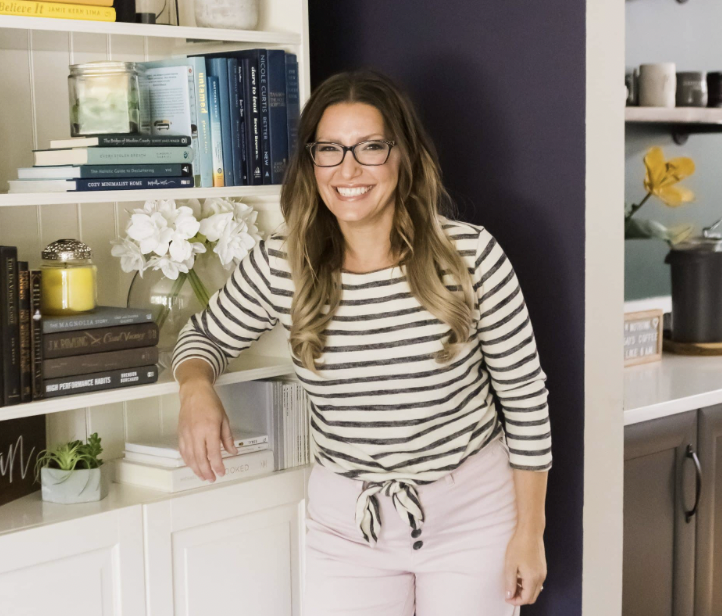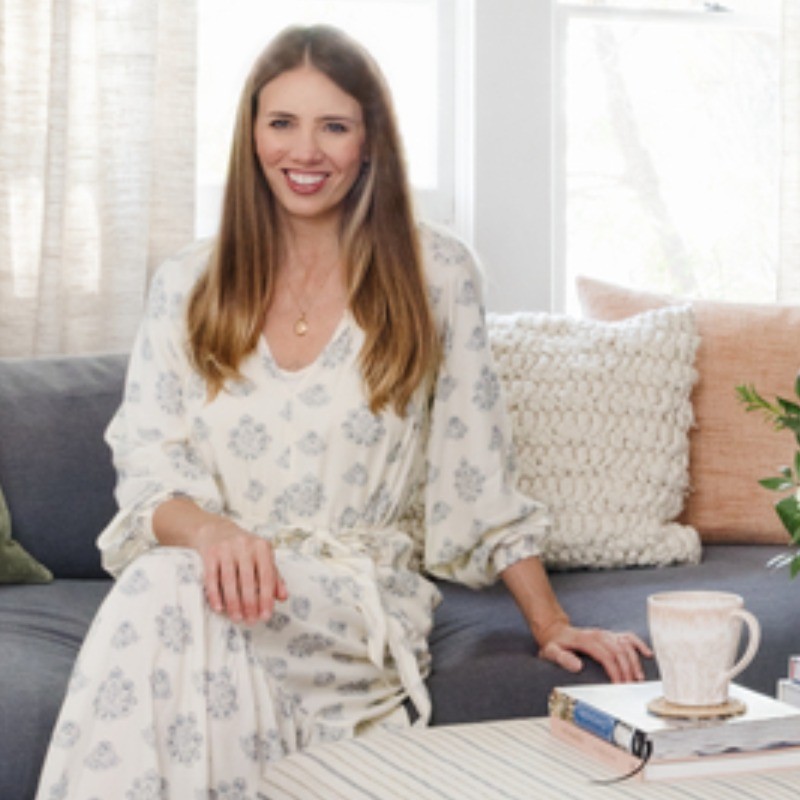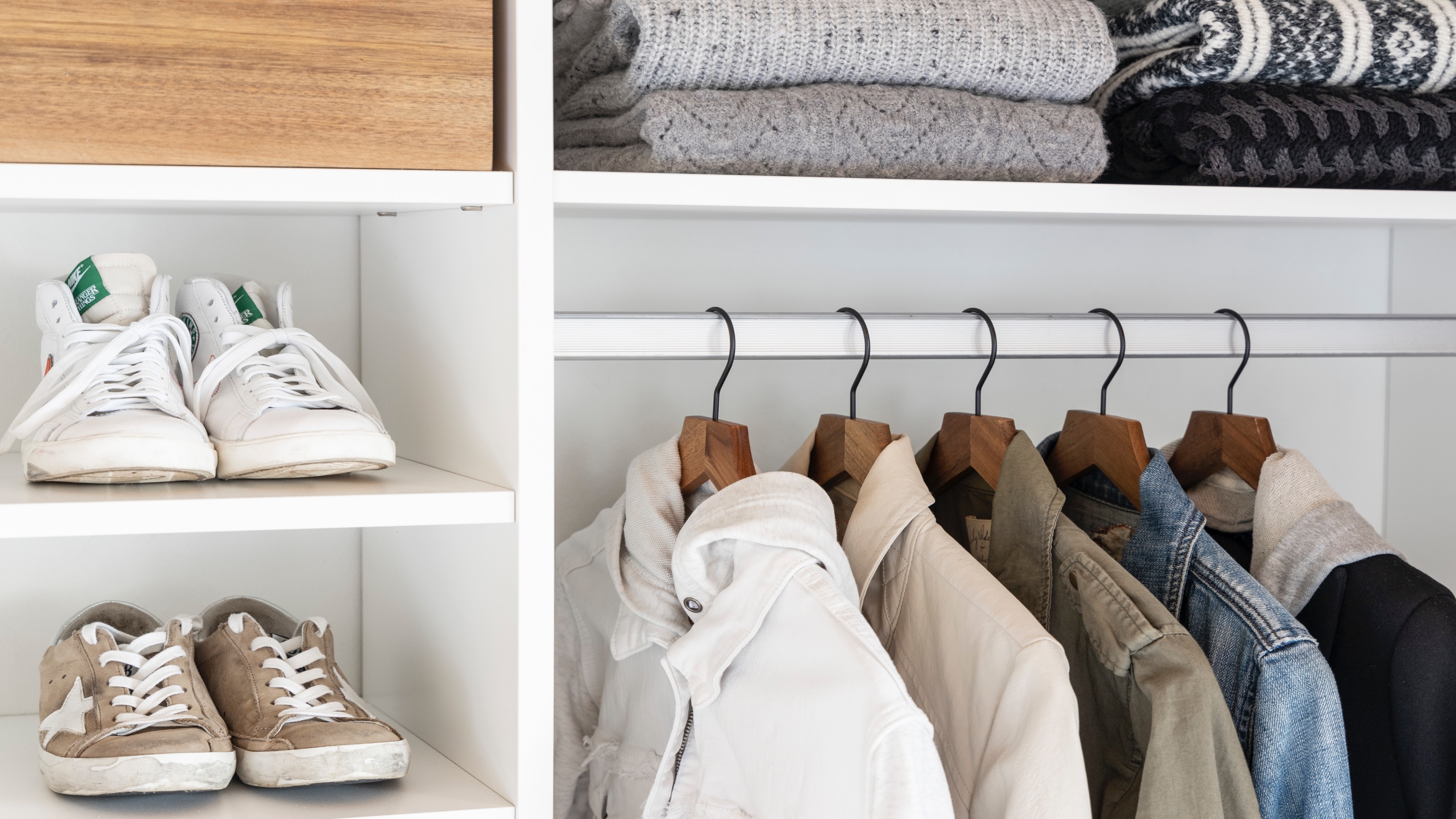
- 1. Streamline your collection
- 2. Donate what you don’t want
- 3. Group clothes by type
- 4. Prioritize everyday essentials
- 5. Dedicate drawers to smaller garments
- 6. Use the file fold method
- 7. Store sweaters on shelves
- 8. Choose the right hangers
- 9. Decide what to hang – and how to hang it
- 10. Make space for accessories
- 11. Stack up shoes
- 12. Swap out seasonal items
- 13. Create a fashionable display
- 14. Protect precious items
- FAQs
- How do you start decluttering clothes?
Get small space home decor ideas, celeb inspiration, DIY tips and more, straight to your inbox!
You are now subscribed
Your newsletter sign-up was successful
If you’re wondering how to organize clothes, there’s no one-size-fits-all approach. Different garments and accessories require unique storage and organizing solutions, and there’s personal style to consider, too.
Deciding which clothing organizational trends suit you can be tricky, so we’ve quizzed the pros on their top tips to help you nail down your style — and keep your closet looking as chic as you.
Taking the time to organize a bedroom so your clothes are neat, tidy, and easy to access not only streamlines your morning routine but makes for a more relaxing space overall.
How to organize clothes like a pro
One of the best bedroom organization tips you’ve probably never heard is to start by gathering every item of clothing you own. Right down to the very last sock. Including those in the laundry basket.
Once you’ve done this, you’re in a good position to work out what you want to keep, what’s best stored where, and what bedroom organizers might be worth investing in.
1. Streamline your collection
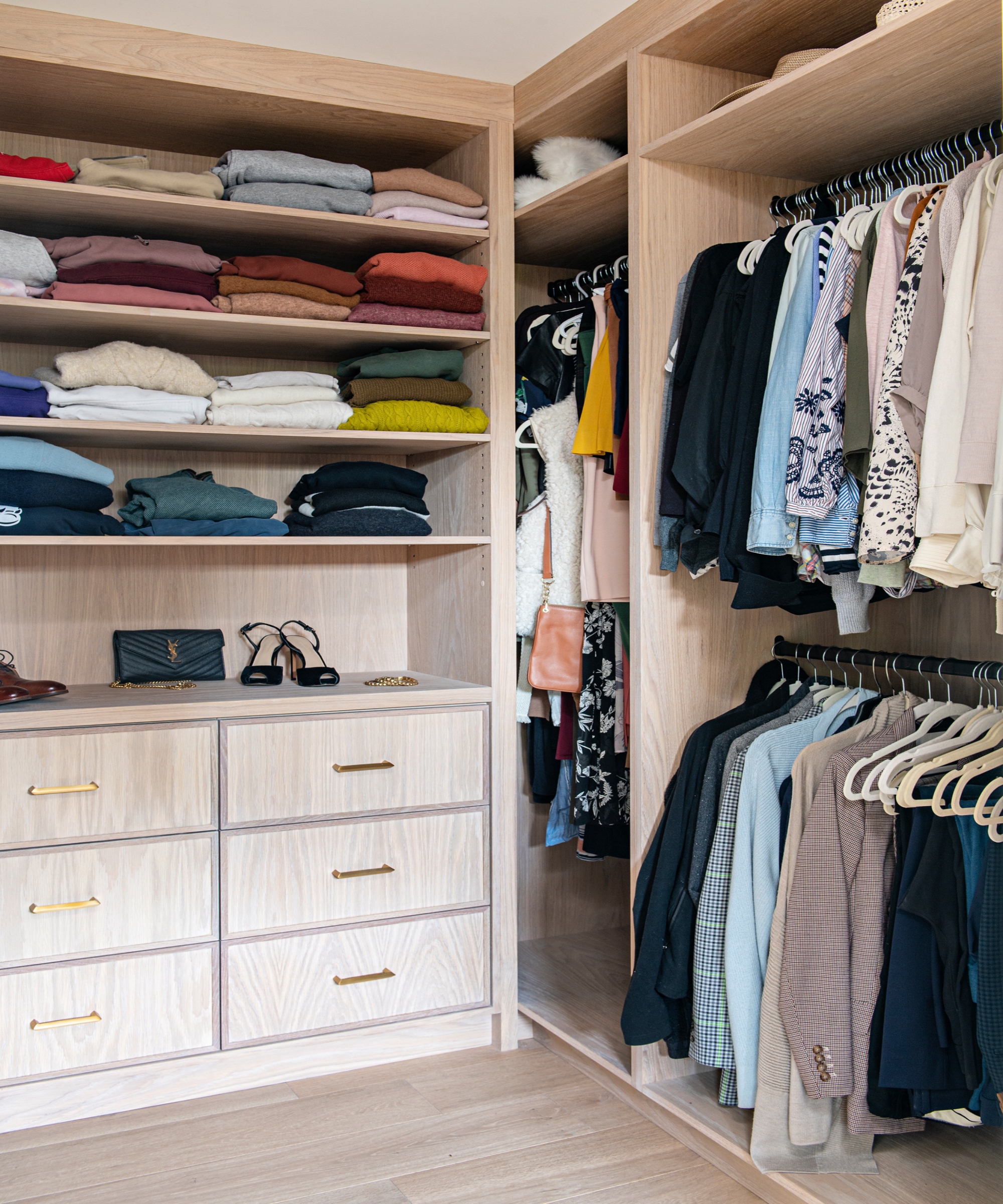
There’s no point creating clothes storage ideas for items you’re never going to wear again, so it’s time to get real with a thorough declutter.
“Go through each item and inspect it thoroughly. Does it fit? Is it in good condition? Have you worn it in the last year?” says Chicago-based home organizer Jessica Litman.
Get small space home decor ideas, celeb inspiration, DIY tips and more, straight to your inbox!
“If the answer is no to any of these, it’s probably time to say goodbye. "Be really honest with yourself, there’s nothing worse than wearing clothes that don’t make you feel good anymore.’’
If you’re struggling to make a decision on certain items, stash them inside these ZALFLEX underbed storage containers, from Walmart. If you don’t miss anything within six months, you’ll know it’s fine to get rid of.
2. Donate what you don’t want
It may feel easier just to throw clothes you no longer want away, but the feel-good factor of supporting a good cause is well worth a little extra hassle! Jessica recommends deciding upon a charity you’d like to donate to ahead of decluttering a wardrobe.
“This allows you to visualize others enjoying them, which makes it easier to part ways,” she says.
To keep your clothing collection clutter-free going forward, we recommend implementing a "one-in, one-out" policy — for every new item you purchase, donate one item from your wardrobe to charity.
3. Group clothes by type
Once you’ve cleared out your clothes, sort what’s left into categories. Popular methods include by garment type (dresses, pants, shirts, etc) or by occasion (casual, workwear, gym gear, etc).
If you want to take it one step further, subcategorize by color, too.
“This will not only make it easier to put outfits together but will elevate the overall aesthetic of the space, worth bearing in mind when organizing a walk-in closet”, says Ashley Murphy, co-founder, and CEO of Neat Method.
If you’re organizing a small closet with a lot of clothes, compliment with the Simple Trending garment rack, from Amazon, and arrange items by color to create a stylish ombre effect.
4. Prioritize everyday essentials
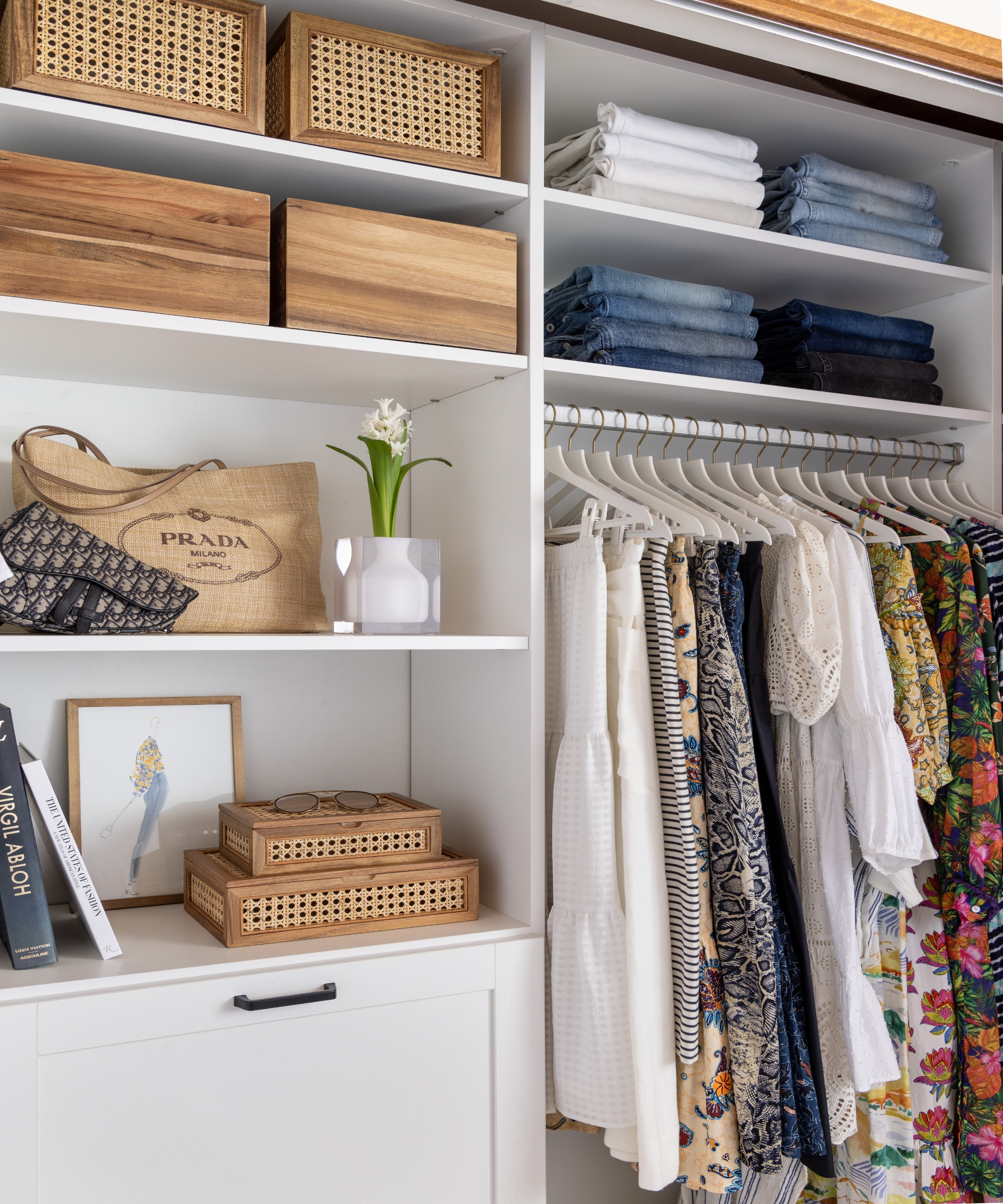
Positioning your most-used items towards the front of your bedroom storage ideas will make your morning routine smoother. Think about ways you can boost closet storage opportunities to increase accessibility with closet organizers. Pull-down hanging rails and expandable shelving racks make space for clothing, while a basic over-the-door organizer, like the Amazon Basics 20 Large Pocket Over-the-Door Hanging Shoe Organizer, from Amazon, is great for storing accessories.
Keep bedroom surfaces neat and tidy with clear caddies, or use a riser, like the Wrought Studio™ riser cube, from Wayfair, to keep essentials close to hand. Position lesser-used items in the space underneath.
5. Dedicate drawers to smaller garments
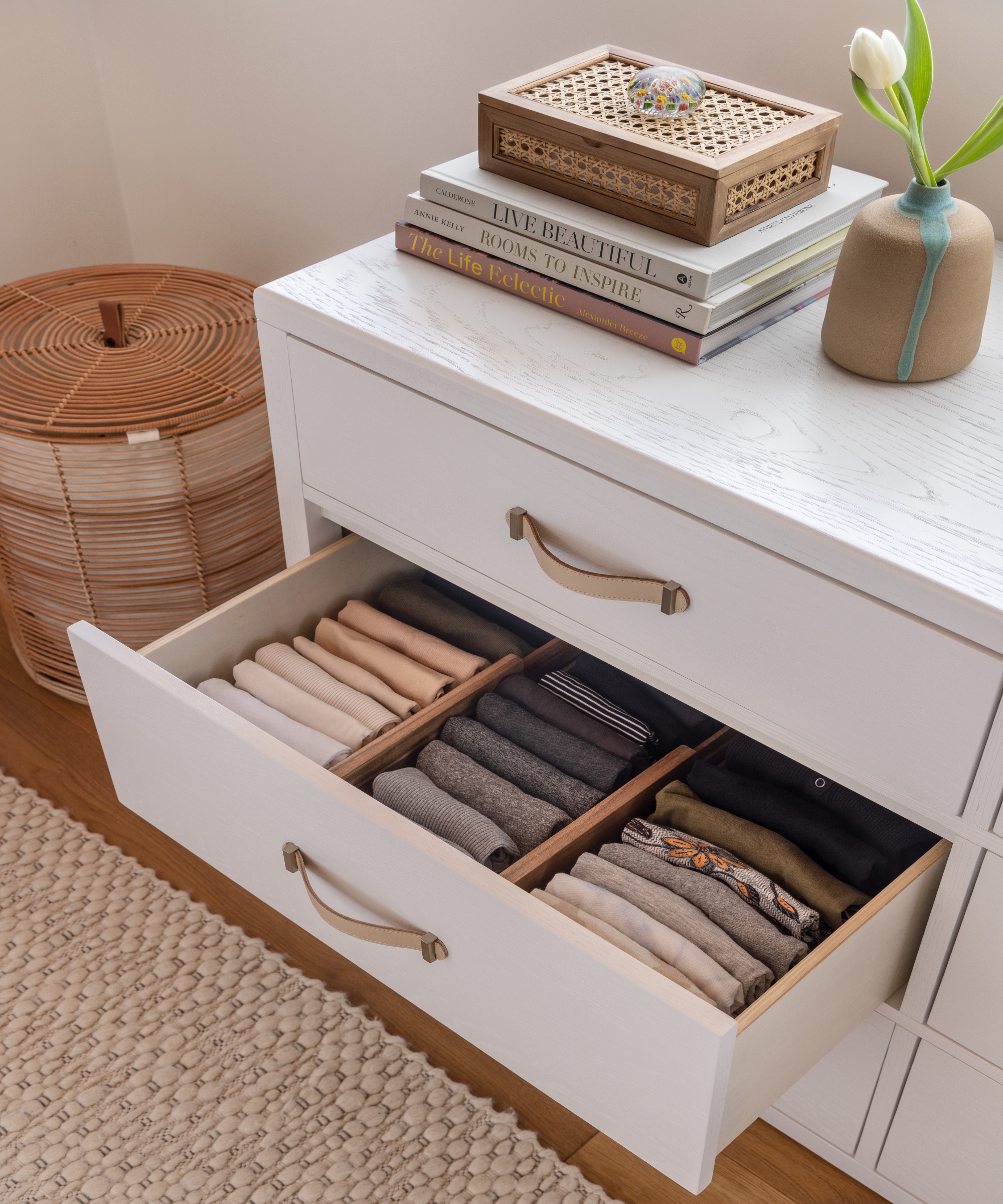
Smaller, more lightweight Items like t-shirts, leggings, underwear, vests, etc, are best stored in drawers, so prioritize space for these when organizing a dresser.
"Shallow drawers lined with dividers or caddies are practical for organizing smaller items, such as skincare and accessories, while deep drawers are better suited to storing neatly stacked clothes. Use the BAMEOS expandable bamboo drawer dividers to keep items in place," says Emily Lambe, Deputy Editor, Real Homes.
If you’re organizing a small bedroom, reserve your dresser space for everyday items and store lesser-used clothing in the Iris USA Stackable Storage Drawers, from Amazon. Make use of the space at the bottom of your closet (separate short and long hanging pieces for easier access) or stack them up in a spare-bedroom closet.
6. Use the file fold method
It may feel like a hassle, but taking the time to fold and store your clothing upright in rows, rather than stacked on top of each other, makes it so much easier to find things, not to mention keeping garments in better condition.
If you’ve run out of drawer space, line a shelf with good-looking baskets (we recommend choosing fabric-lined versions to prevent snagging, like these Vive Comb collapsible cotton flax storage bins, from Walmart) and file-fold items by type; t-shirts in one, leggings in another, etc. Don’t forget to label it!
7. Store sweaters on shelves
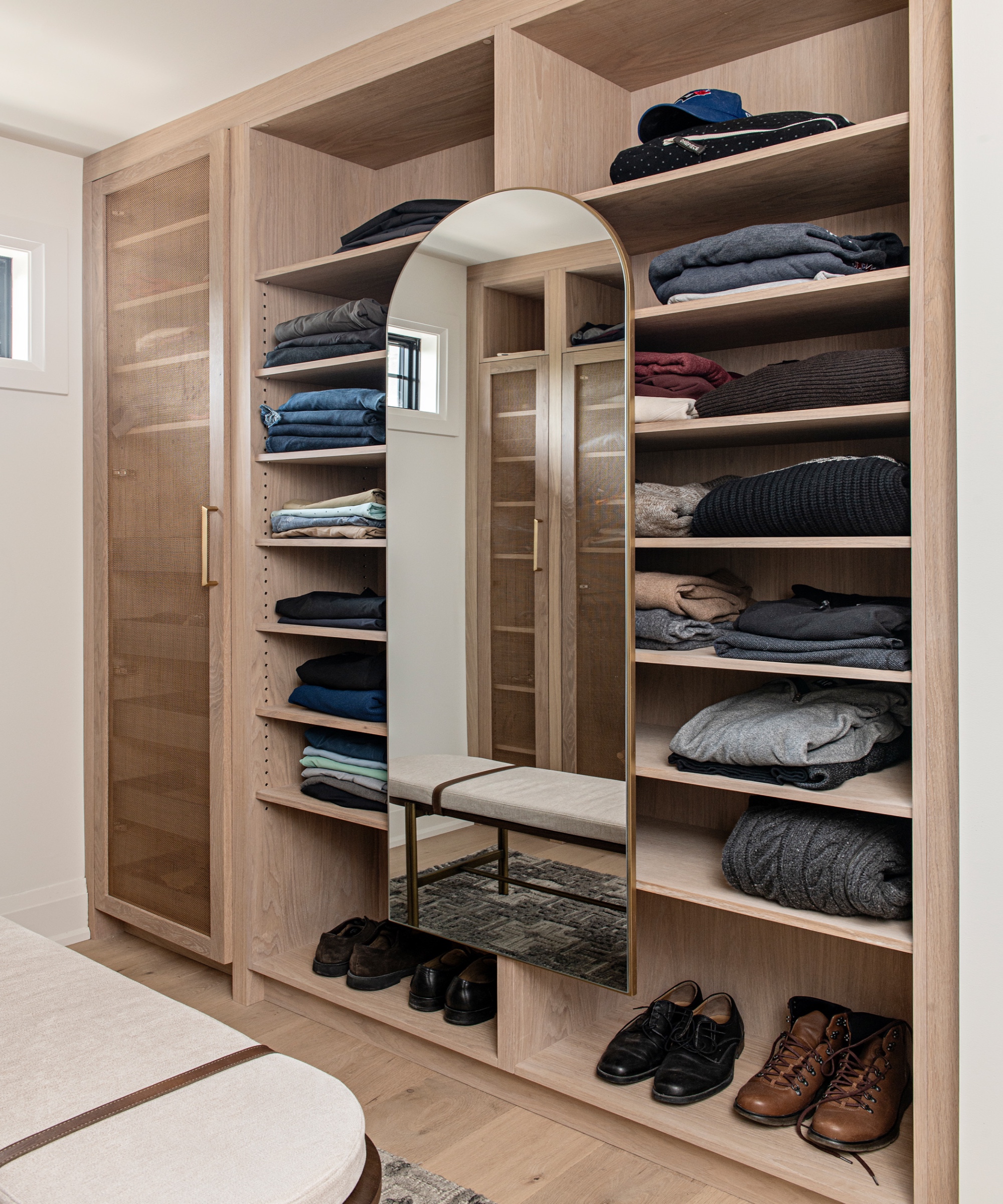
Sweaters keep their shape better when folded, but they take up too much space in drawers. Cubby-style shelving is the ideal solution for keeping them neatly stacked. if your closet’s lacking, customize with a box-style hanging unit, like the Rebrilliant Savion six tiers hanging organizer, from Wayfair. It features handy side pockets and is strong enough to hold shoes and purses, too.
If you’d rather keep your hanging space, invest in a freestanding unit, or line long shelving with vertical separators (such as the Richards Acrylic Shelf Dividers, from Walmart) to retain smart piles.
8. Choose the right hangers
The humble hanger can make a big difference to your closet organization ideas, so it’s important you get it right.
“It’s a very affordable luxury that will dramatically transform your closet from haphazard chaos to purposeful organization”, says Heather Goerzen, design editor at Havenly. “We’re partial to non-slip velvet as they won’t create any weird creases in your shirt’s shoulders, and clothing tends to stay put.”
If you’re short on hanging room slim-line hangers or multi-layer hangers (try the Tinfol pant hangers, from Amazon) are space-saving options. Just be sure not to cram too much in as it’ll look cluttered and could damage your clothing.
For your best garments, or those that are heavier in weight (think jackets, suits, and embellished dresses) are best stored on sturdy wooden hangers. Stick to one design so they sit neatly alongside each other. We like the simple Scandi-aesthetic of the Brightroom™ wood suit hangers, from Target.
9. Decide what to hang – and how to hang it

Coats, suits, blouses, pants, and dresses are best hung up, but remember never to hang anything made from wool or cashmere — they become misshapen around the shoulders if you do.
“Identify clothing quicker by hanging everything in categories, all facing the same direction. Take it a step further by implementing matching hangers to elevate the look of your closet and ensure everything is hanging at the same level”, advises Ashley.
10. Make space for accessories
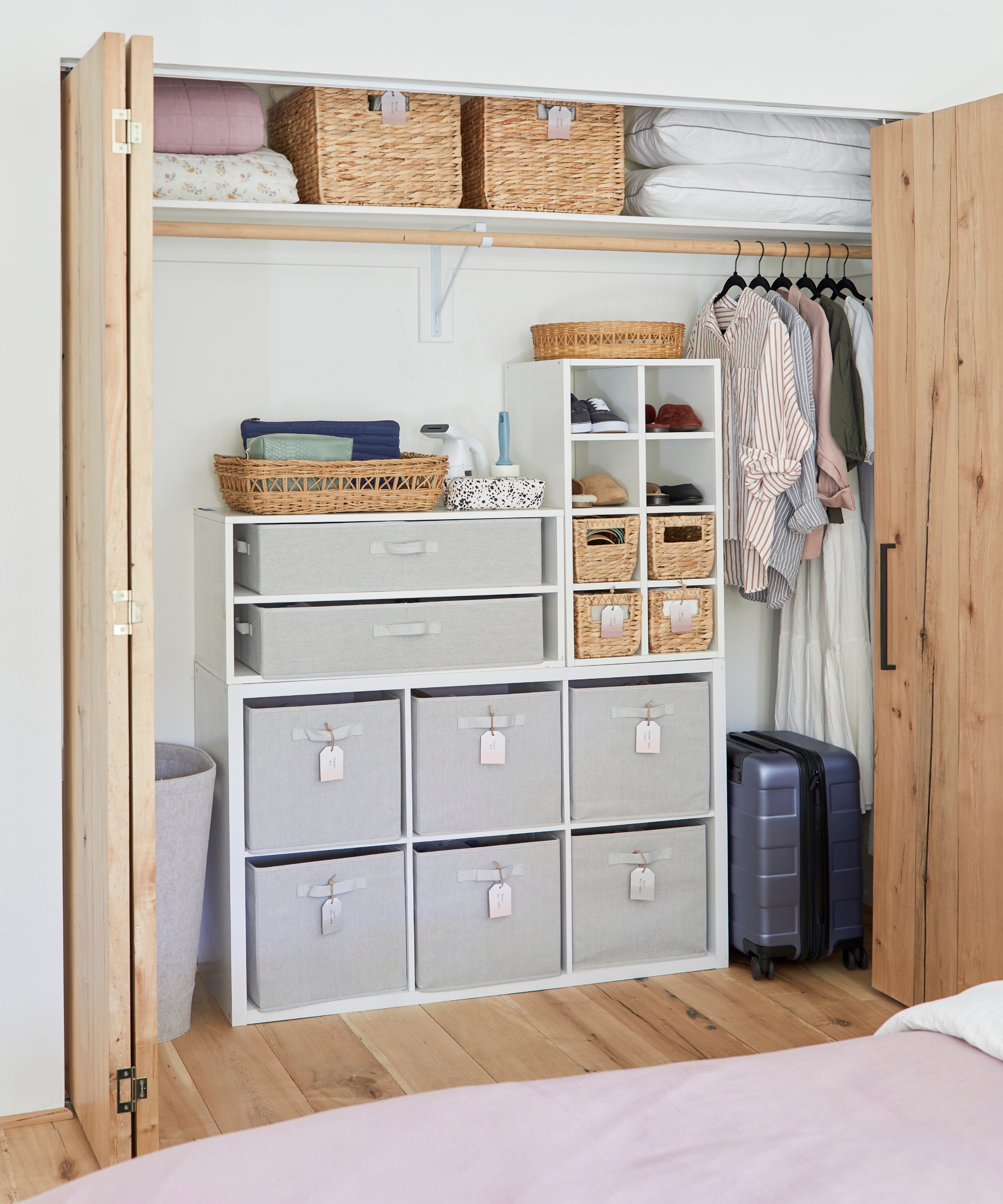
Accessories make an outfit, so you’ll need to include space for them in your organization system. Depending on what storage you have available to you, there’s plenty of item-specific organizers you can employ.
Sectioned organizers such as the Poeland honeycomb divider, available on Amazon, are great for containing smaller garments or socks and undies, as well as smaller accessories such as ties, glasses, and belts.
“If you have multiple handbags but not enough shelving space to display them, consider using shelf dividers or purse hangers (like the Lionweli rotating handbag hanger rack, from Amazon). Stuff them with tissue paper so that they retain their shape. Store shoes in clear, stackable containers and take a photo of each pair to stick onto the front of the container”, advises personal stylist Erica Ball.
11. Stack up shoes
“Arrange shoes by type, then color and line up in rows on closet shelving. If shelves are at a minimum, consider arranging sandals, sneakers and slippers in upright rows within stylish (and sturdy) Oxford bins, from Neat Method. Customize with handy label holders sets, also from Neat Method, to keep on top of organization”, says Ashley.
Tiered racks or stackable shoe boxes (like these from Target) both work well, but if your shoe storage ideas are restricted to shelving, you can usually fit twice as many pairs with the right shoe organizers. Try these space-boosting shoe risers from Amazon, designed to stack shoes without damage.
12. Swap out seasonal items
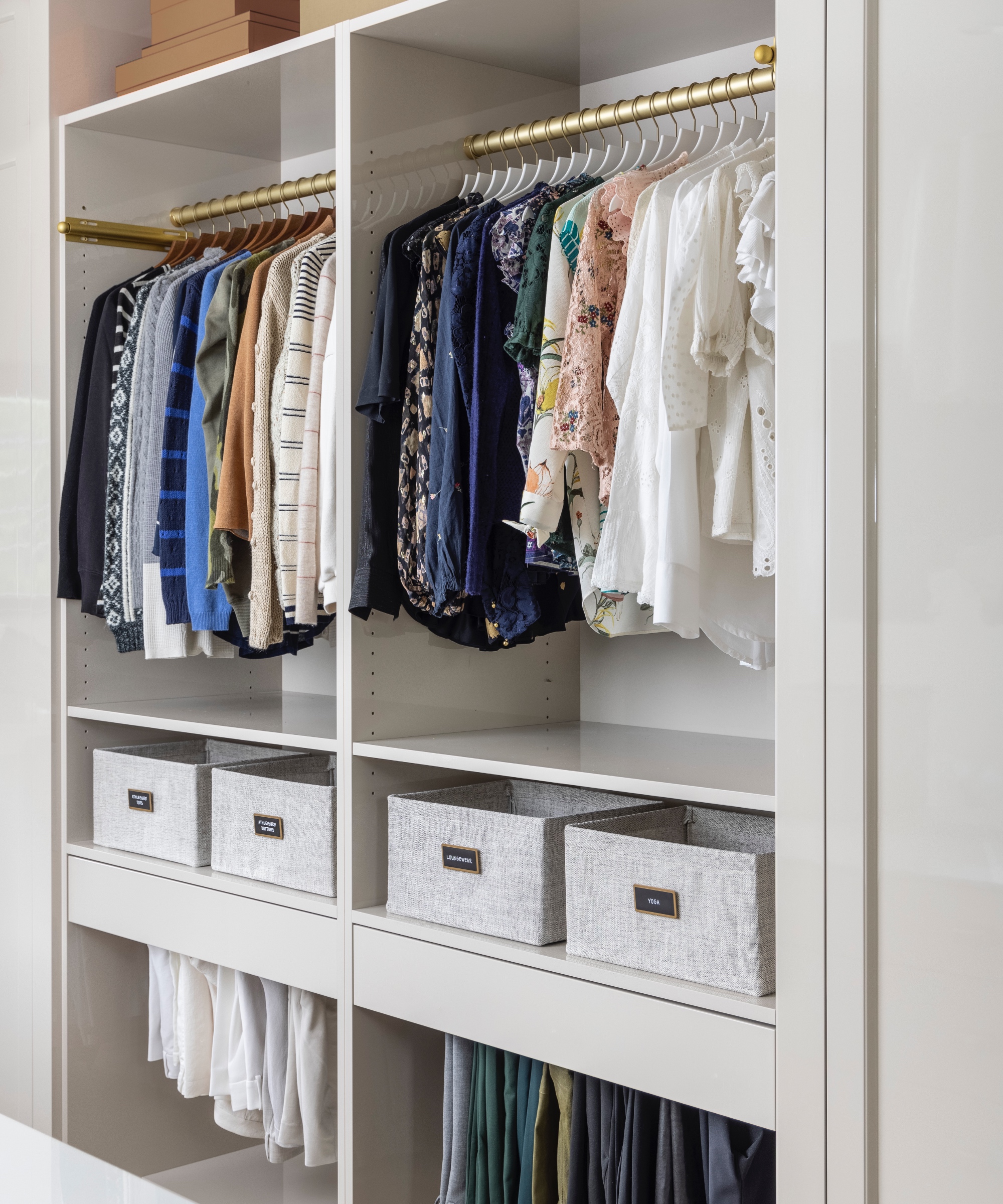
Separating your clothing by season is a sensible move, whether you’re organizing a small closet or not — there’s no point rummaging through winter knits in the midst of summer!
Stash in vacuum-sealed storage bags (these PROMART MagicBag by Smart Design storage bags, from Walmart, are one of our best clothes storage bags for out-of-season fits) and stow them away. This tactic applies when organizing a small entryway closet, too.
13. Create a fashionable display
Make a style statement by integrating your favorite fashion pieces into your bedroom ideas. Purses arranged on open shelving, beautiful necklaces hung from decorative wall hooks, shoes positioned in cubby holes… take the opportunity to get creative! As well as adding aesthetic value, it frees up space in your closet and dresser for less 'sightly' items — win, win!
14. Protect precious items
If you’ve spent money on something fancy, it’s important you look after it. Store purses on a top shelf, ideally in their original dust bags, and keep special shoes in boxes.
“Use clear garment bags (this 50 pack ofAbaima garment bags, from Walmart, is great value) so that you can easily see what's inside, and hang them in a separate part of your closet,” says Erica.
“Keep everything that needs to be steamed in a separate section of your closet and plan a weekly time to steam all of those items before hanging them with your ready-to-wear clothing.”
FAQs
What’s the most efficient way of organizing clothes?
How you organize clothes will depend on a variety of factors, including how big your collection is, and how much space you have. In order to maximize efficiency, group items by type, choose storage solutions to suit specific garments and always bear ease of access in mind.
How do you start decluttering clothes?
Decluttering clothes can feel overwhelming, particularly if you have a lot of clothes to get through, so keep things as simple as possible.
Gather everything in one place so you can see exactly what you’ve got. Assign two categories — keep and donate/throw — and work your way through each item, one by one. Be honest with yourself: does it still fit? Is it in good condition? Have you worn it in the last year? If the answer is no to any of those, it’s time to get rid.
Whether you’re looking for small bedroom ideas or not, streamlining your clothing is an on-trend choice. Sustainable, stylish, and easier to manage, capsule collections are all the rage, and we’re here for them!
Make your garments work harder by getting into the habit of pre-planning your outfits for the week ahead. Not only will it save you time, but it’ll avoid any last-minute panics over unwashed or creased clothing, so you can start the day stress-free and looking good.
After the arrival of her second son – and subsequent departure of any free time outside of his unpredictable nap schedule (!) – seasoned writer Tara King decided to move on from her position as a Content Editor and enter the exciting world of freelance, covering interior design, DIY and lifestyle. Alongside features for Realhomes.com, Tara writes for Ideal Home, Style at Home, Country Homes & Interiors and other interiors publications. When she’s not working or ‘mumming’, she can be found (hiding) in the garden, attempting DIY projects… with varying levels of success!
